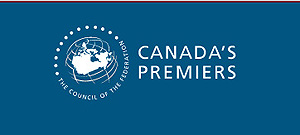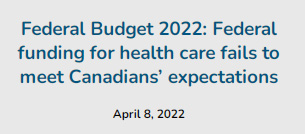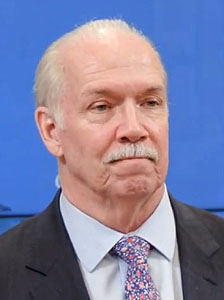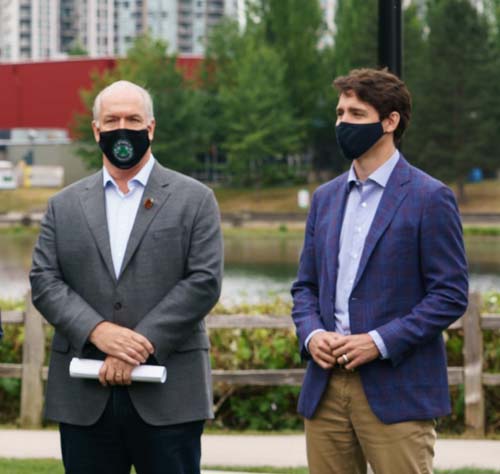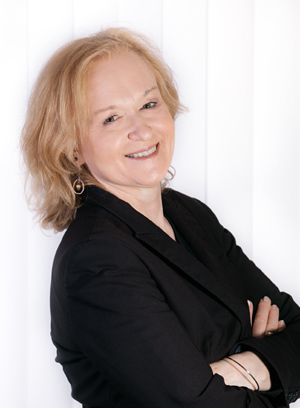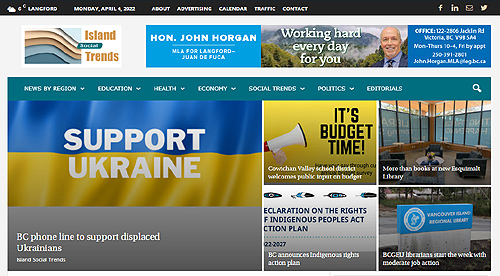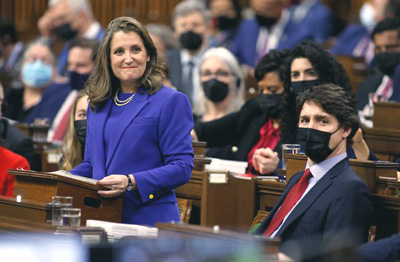
Monday April 11, 2022 | COLWOOD, BC
by Mary P Brooke, B.Sc., Editor | Island Social Trends
Budget 2022 did not give in to the persistent request from Canada’s provincial and territorial premiers for a flat percentage increase to the Canada Health Transfer (CHT). That’s somethings the premiers of Canada’s provinces and territories have been asking for, for a while now, through negotiations with the Prime Minister.
During those Council of the Federation (COF) negotiations between the premiers and Prime Minister Justin Trudeau during the first two years of the pandemic, Trudeau’s repeated response was that any health-care funding increases (through the CHT mechanism) would be dealt with after the pandemic.
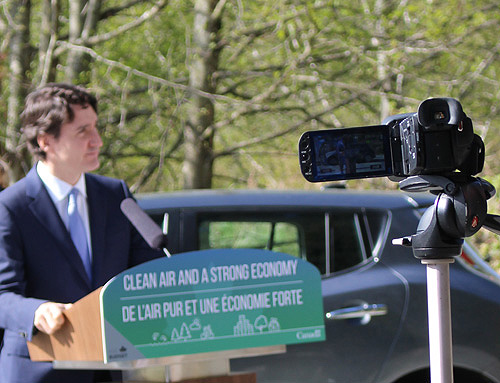
Federal help during COVID:
Significant health system support funding was already being issued by the federal government during the 2020 and 2021 phases of the pandemic. That includes the procurement of COVID vaccines (distributed free to the provinces), and most recently a $2 billion transfer to help provinces catch up with surgical load backlogs.
The delivery of health-care is technically a provincial responsibility. But the pandemic brought to light just how variable the Canadian universal health-care system amongst the provinces and territories. The Canadian public became more aware that a national vision for the specifics of health-care delivery was not being articulated.
Meanwhile, Trudeau’s government stepped up agreeably and enthusiastically throughout the primary phases of the crisis, most notably securing ample supplies of vaccine products, as well as therapeutics, and personal protective equipment (PPE) along the way. Military personnel were provided to help out in long-term care facilities, on the federal government’s dime.
Turning attention to CHT:
While the COVID pandemic itself continues as a health situation (the world is now in year three as the SARS-CoV-2 virus continues to mutate), the economy has rebounded after two years of pandemic-related disruption. Now it seems the federal government will turn its view to the CHT, but on their own terms.
Last week while rolling out Budget 2022 — which she defended as fiscally responsible (including a declining deficit over the next couple of years), Deputy Prime Minister and Finance Minister Chrystia Freeland said that ‘planning and clarity’ are required for any across-the-board increase in the CHT to the 13 provinces and territories.
Premiers disappointed in budget:
Until now, the Council of the Federation (premiers of all the provinces and territories) — chaired by BC Premier John Horgan — has been requesting a flat across-the-board increase to the CHT, without strings attached. The COF response to Budget 2022 last week was one of “disappointment”, saying in a news release on April 8 that “the recent federal budget failed to provide a significant, long-term increase in federal health care funding to support the health and well-being of Canadians”.
“The federal budget missed an opportunity to address the major health care challenges facing Canadians,” said British Columbia Premier John Horgan, Chair of the Council of the Federation. “Increased, predictable and sustainable federal health funding would make a real difference in people’s lives. Unfortunately, the federal budget failed to deliver on this priority.”
“Premiers are united in their call for an immediate long-term funding commitment by the federal government, delivered through the Canada Health Transfer,” it was stated in the COF news release. “Premiers have consistently called on the federal government to increase its share of provincial-territorial health care costs through the CHT from 22% to 35% and to maintain it at this level over time. This is essential to the sustainability of Canada’s health-care systems and ensuring that Canadians have timely access to quality health services wherever they live in Canada. One-time or short-term targeted spending cannot address the long-term challenges facing Canadians’ health-care systems.”
The Premiers say they have invited the Prime Minister “to work with them and begin negotiations without further delay so that a First Ministers’ Agreement on Sustainable Health Care Funding can be finalized as soon as possible”. Today there did not seem to be resistance on Trudeau’s part, only that some deeper work needs to be done.
Trudeau today regarding the Canada Health Transfer:
Today Island Social Trends asked Prime Minster Justin Trudeau for a few more details on that intention, during his live morning press conference on the Royal Roads University campus in Colwood. Is there a national vision for any change in the CHT, and would that include looking at facilities, health-care worker training, and billing rates for physicians?
“Especially coming through this pandemic, we need more investments in health-care,” Trudeau said today. “We need to make sure Canadians from coast to coast to coast are getting the absolute best quality health-care possible.”
“During the pandemic the federal government stepped up with close to $69 billion in new spending health-care related, much of it transfers to the provinces, to be able to get through this health crisis that was the pandemic. But we know there is a need for more long-term structural spending to go at some of the deeper challenges faced by Canadians across the country in accessing top quality health-care,” the prime minister said today.
“That’s why we’re engaged in conversations with the Council of the Federation, specifically with Premier Horgan, to try and talk about how we can really make sure that money invested in health-care from the federal government … because we are very clear, there will be significantly more money from the federal government in health-care,” Trudeau said. And he continued:
“But we’ve seen in the past, in decades past, that just more money into health-care, even from the federal government, doesn’t necessarily lead to the right outcomes, or better outcomes, for Canadians,” Trudeau said. “So this time, we’re sitting down carefully to talk about how to make sure that new investments in health-care will deliver the results Canadians need from better access to family doctors and nurses, to primary care, more investments in the kinds of… (things people need). “We just did $2 billion a few weeks ago to help provinces with some of the backlogs in surgeries that accumulated over COVID.”
Working together:
“We’re working hand in hand,” Justin Trudeau said today regarding health-care discussions with COF Chair Premier Horgan and the other provincial and territorial premiers. “There will be more money for health-care. We just need to all of us work together to make sure that it actually delivers results for Canadians.”
It remains unaddressed in Budget 2022 or any statements so far about the CHT as to how long-term care will be handled in Canada. That’s of particular note due to the crisis for elderly people in long-term care during the pandemic; many deaths occurred in those congregate settings, where the airborne COVID (SARS-CoV-2) virus was shared in relatively closed and contained spaces. However, a more nuanced view of the comments made by Trudeau and Freeland as to ‘planning and clarity’ of health-care funding could be seen to include how wellness of seniors might be addressed.
Presumably the housing file could also be creatively dovetailed into that, if the accelerated housing supply promise includes any incentives to developers to build homes more frequently that include separate suites or additional layout features to accommodate an elderly relative living-in with younger family members.
Variables:
Not only do the various provinces and territories do things differently, there are significant baseline differences that would complicate attempts for a fair across-the-board increase.
For example, BC already has a Pharmacare program, but most other provinces do not. Some provinces presently have more long-term care facilities privately operated than others. Billing schedules for doctors vary across jurisdictions.
Some provinces have more of a doctor-shortage problem than others. In BC about 700,000 to 900,000 people are without a family doctor (including about 30,000 in the west shore region of Greater Victoria). Longitudinal care (provision of health-care over a period of time with one caregiver) is thought to provide greater continuity of care. In BC the family doctor billing schedule is thought to be the core issue as well as many older doctors retiring and younger ones choosing other areas within the medical profession (including tele-health); meanwhile, several primary care clinics have been launched in the past few years in an attempt to stave off the worst of the crisis.
Victoria today:
Prime Minister Justin Trudeau started his day out in the west shore with an emphasis on increasing the use of electric vehicles by Canadians. Then he attended media events in the City of Victoria in the afternoon, including a meeting with Victoria Mayor Lisa Helps.
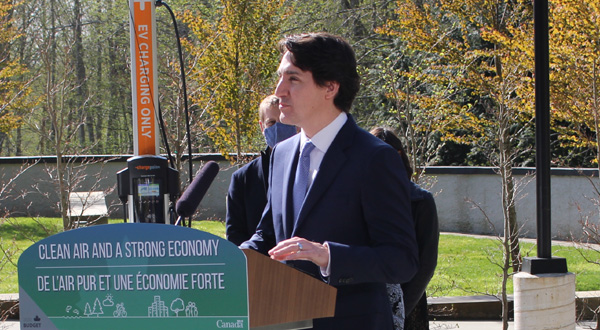
===== ABOUT THE WRITER:
Island Social Trends Editor Mary P Brooke, B.Sc., Cert PR. has been writing about socioeconomic issues on the west shore of south Vancouver Island since 2008.
Her publication was first called MapleLine Magazine (2008-2010), then morphed into the print weekly Sooke Voice News (2011-2013), then into the weekly print and PDF format West Shore Voice News (2014-2020) before emerging as a full online news portal in mid-2020.
Island Social Trends offers a journalism scholarship to graduating high school students in the west shore.




